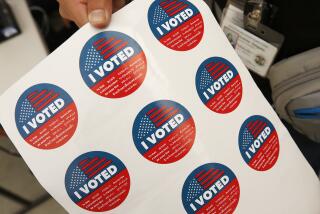New State Fund May Be Spark to Start More Adult Care Centers
Medically oriented day-care centers for adults, once hailed as a promising way to care for the disabled and elderly, have failed to achieve the growth and popularity that Los Angeles County health officials predicted just four years ago, state and county officials said.
But new state legislation providing up to $1.5 million in start-up funds may help more centers to open, the officials said.
In 1981, when the county began licensing adult daytime health care centers as part of a statewide program, it set a goal of opening 307 centers by 1986.
But less than three months shy of the target date, only seven Los Angeles County centers have been licensed, according to Dottie Green, geriatrics coordinator for the county Department of Health Services.
10 Centers Planned in Valley
Ten centers were planned for the San Fernando Valley area. Only one has opened--the Valley Storefront Adult Day Health Care Center in North Hollywood run by Jewish Family Service of Los Angeles.
Health officials blame the sluggish expansion on high start-up costs and inadequate reimbursements for continued care.
First-year operating costs typically are about $200,000, according to Green. Additionally, there is usually a three-month lag before centers are reimbursed by the state for Medi-Cal patients. This becomes a crucial issue when 60% of average enrollment is paid for by Medi-Cal, state officials said. At some centers, the figure is closer to 90%.
Medi-Cal reimbursement, which is paid directly to a center, is about $32 a day per patient, according to state officials. Centers also accept private patients, usually charging them based on a sliding scale depending on their ability to pay.
Simple Concept
The concept of adult day health care is simple: to provide a medically supervised daytime environment for physically and mentally disabled adults who might otherwise be isolated at home or confined to nursing homes.
In Los Angeles County, centers provide an average of six hours a day of rehabilitative therapy, mental and physical stimulation and personalized attention. A nutritionally balanced lunch is included.
Because the goal is to care for patients, not to make a profit, county and state licensing boards require that centers be operated by public or nonprofit entities. Most centers are staffed partially by volunteers, and all centers need “a strong commitment to serve the community,” Green said.
Recognizing that such organizations also may require outside financial help to open day-care centers, legislation sponsored by state Sen. Henry J. Mello (D-Watsonville) and signed Sept. 28 by Gov. George Deukmejian provides up to $50,000 to groups that raise 20% in matching funds. For example, a center that requests $10,000 would be required to match $2,000.
Availability of Funds
The money, which must be used for staffing, rent or renovation, is available to centers in the first four years of operation, according to Charlene Welty, chief of adult day health care for the California Department of Aging.
The funding is expected to almost double the 39 adult day health care centers in operation throughout California, according to health officials. But between 600 and 1,000 such centers are needed, Mello said. To support his large-scale plan, Mello cited a study showing that 84% to 96% of all adults enrolled in adult day health care either maintain or improve their condition.
Prospective centers in Los Angeles County are screened jointly by the state Department of Aging and the county’s Adult Day Health Care Planning Council, whose members are appointed by the county Board of Supervisors.
Before granting licenses, state and county officials hold a joint public hearing, Welty said. After obtaining public comments and reviewing applications, qualifying centers are licensed as health-care facilities and receive state certification as Medi-Cal providers, which makes them eligible to receive Medi-Cal funds.
Once licensed, centers must comply with a wide range of county regulations.
According to Green, these include having a physician on call and hiring an administrator, registered nurse, activities director, dietitian and medical social workers. Additionally, centers must hire licensed therapists to provide occupational, speech and physical therapy.
Organizations also may be required to refurbish buildings or find new locations for their centers. Other county regulations call for adult day-care centers to provide facilities to store or serve food, and to locate on the ground floor to provide access to handicapped or wheelchair patients, Green said.
Large Centers Cost-Effective
Because of the high overhead incurred regardless of whether 10 or 50 patients are enrolled, large centers are more cost-effective, Green said.
Conversely, small centers, such as the 25-patient Valley Storefront center, are able to offer personalized attention and camaraderie among staff and patients because of their small size.
Although hospitals, with their ready access to medical professionals, might be considered natural sponsors of adult day health care, only Pomona Valley Community Hospital has opened such facilities in Los Angeles County, Green said.
More to Read
Sign up for Essential California
The most important California stories and recommendations in your inbox every morning.
You may occasionally receive promotional content from the Los Angeles Times.










